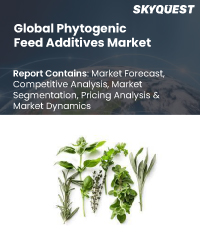
Report ID: SQMIG30C2077

Report ID:
SQMIG30C2077 |
Region:
Global |
Published Date: February, 2024
Pages:
242
|
Tables:
62 |
Figures:
75
Phytogenic Feed Additives Market size was valued at USD 940 Million in 2023 and is poised to grow from USD 1018.02 Million in 2024 to USD 1927.74 Million by 2032, growing at a CAGR of 8.3% during the forecast period (2025-2032).
Phytogenic feed additives, also known as plant-based feed additives, are natural substances derived from herbs, spices, and other plants that are added to animal feed to improve animal health and performance. These additives are used as alternatives to synthetic feed additives, such as antibiotics, growth promoters, and preservatives, which are commonly used in animal feed. Phytogenic feed additives contain various bioactive compounds, including essential oils, tannins, flavonoids, and saponins, which have antimicrobial, antioxidant, anti-inflammatory, and digestive stimulant properties. These compounds help to improve the digestibility of feed, enhance the absorption of nutrients, and boost the immune system of animals. Phytogenic feed additives are commonly used in the production of meat, dairy, and poultry products, and are also used in aquaculture and pet food. They are considered safe and environmentally friendly and are increasingly being used as a natural alternative to synthetic feed additives in response to consumer demand for natural and organic products. The use of phytogenic feed additives in animal feed has several benefits, including improved feed efficiency, reduced risk of disease, and improved animal welfare. Moreover, the use of these additives can also improve the quality and safety of animal products, as they reduce the risk of antibiotic resistance and other health issues associated with the use of synthetic feed additives.
The global phytogenic feed additives market is expected to experience significant growth during the forecast period. The growth of the market is attributed to several factors, including the increasing demand for natural and organic products, the growing concern for animal health and welfare, and the ban on the use of antibiotics in animal feed in several countries. The meat and dairy industry is the largest end-user of phytogenic feed additives, owing to the increasing demand for high-quality animal products and the growing awareness about the benefits of using natural and organic feed additives. The poultry industry is also a significant end-user of phytogenic feed additives, owing to the high demand for poultry products and the need to improve the growth performance of birds.
Moreover, the increasing demand for phytogenic feed additives in aquaculture and pet food is also driving the growth of the market. The rising awareness about the benefits of using natural and organic feed additives, and the increasing demand for high-quality and safe products, are driving the growth of the market in these industries. The market is dominated by several key players, including Cargill, BIOMIN, Delacon, Pancosma, and Adisseo. These companies are investing in research and development activities to develop new and innovative products, and are also expanding their production capacities to meet the growing demand for phytogenic feed additives. In conclusion, the global phytogenic feed additives market is expected to witness significant growth during the forecast period, owing to the increasing demand for natural and organic products, the growing concern for animal health and welfare, and the ban on the use of antibiotics in animal feed in several countries.
US Phytogenic Feed Additives Market is poised to grow at a sustainable CAGR for the next forecast year.
Our industry expert will work with you to provide you with customized data in a short amount of time.
REQUEST FREE CUSTOMIZATIONWant to customize this report? This report can be personalized according to your needs. Our analysts and industry experts will work directly with you to understand your requirements and provide you with customized data in a short amount of time. We offer $1000 worth of FREE customization at the time of purchase.

Report ID: SQMIG30C2077